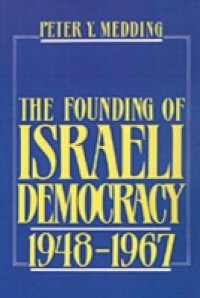Israel is the only new state among the twenty-one countries in the world today that have maintained democracy without interruption since the end of the Second World War. Israel's case is all the more notable because its democracy was established under extremely adverse conditions: massive immigration; severe social dislocation; the introduction of ethnic, cultural, linguistic, religious, and national differences; rapid economic growth; a permanent security threat that led to five major wars in thirty-five years; and a population that, in the main, had little or no experience of a democratic order. In this insightful study of Israel's founding period from 1948 to 1967, Peter Medding addresses this puzzle, providing a lucid account of the political and historical conditions that gave rise to this distinctive period, as well as the changes which brought it to an end. The result is an eminently readable account of the state-building process and of the role played by David Ben-Gurion and other politicians in moving from consensus politics to a majoritarian-like democracy. Medding's analysis is further enriched by his comparisons of the development of Israeli democracy with that of other countries.

